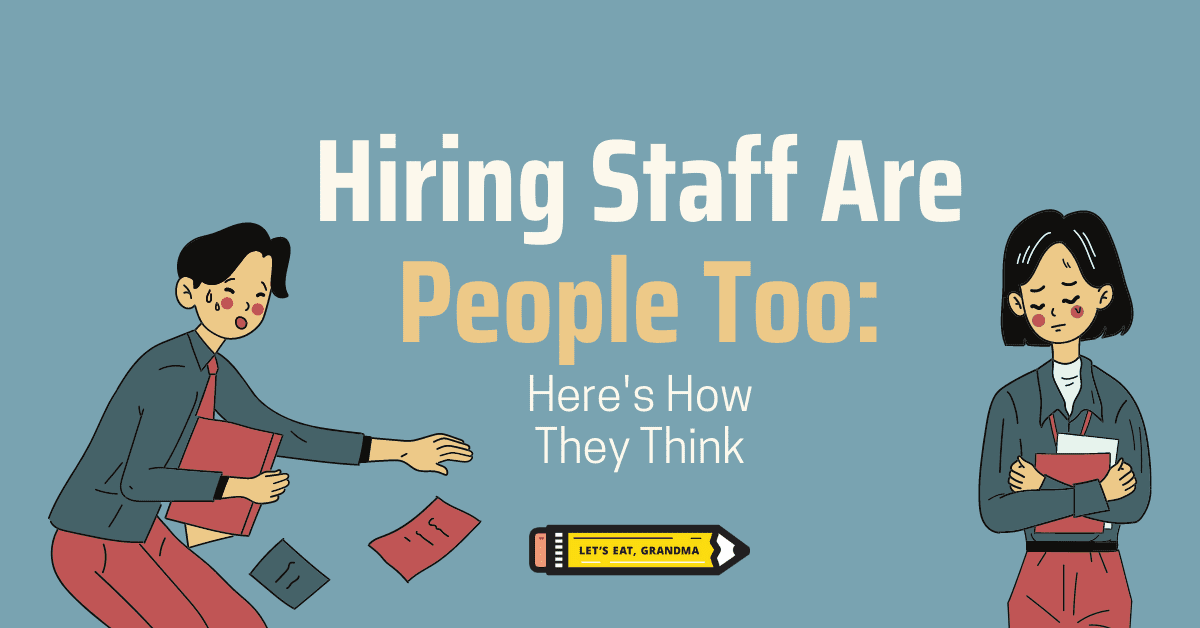Hiring Managers Are People Too: Here’s What They’re Really Thinking About You

Hiring decisions are made by people just like you, so you should understand what makes them tick. Here’s an inside look at what a hiring manager thinks before, during, and after their interview with you.
By: Ashley Dolar | Contributor for Let’s Eat, Grandma
Job hunting can be a grueling process. You spend hours looking for open postings, connecting with your network, and sending countless resumes into the world.
But what happens on the other side? Are hiring managers sipping piña coladas instead of reading your carefully crafted cover letter?
While that’s unlikely, it’s important to remember that hiring managers are people, too! They aren’t robots who mindlessly sift through hundreds of resumes for hours on end. They require food, water, and bathroom breaks just like the rest of us.
Want more job search tips? Sign up for our newsletter!
They also genuinely want to find the best candidate, and they likely have to work with a team and please multiple stakeholders in the company.
So, when it comes to considering you for the job, what are they really thinking?
What Hiring Managers Think: Before the Interview…
1. “Did this person follow the directions?”
This is a lesson that follows you from elementary school all the way into the workforce. If the organization asks for a resume, cover letter, and online application, the hiring manager will be looking for each one of those components. Even with stellar qualifications, a failure to upload every document to the proper place might mean a failure to launch.
2. “Does this resume outshine the competition?”

Make sure your resume clearly shows that your qualifications match the job description.
A hiring manager is looking for enthusiastic, qualified candidates, and a well-written resume can help you stand out from the crowd. It’s important to be honest while highlighting your most important professional accomplishments. It also helps to tailor your resume (and cover letter!) to each job posting. That will help the hiring manager see that you are skilled and passionate enough for this particular position. (Plus, if you don’t clearly show that you meet the basic qualifications of the position, they might be required to pass, even if they like you!)
3. “Do we have any personal or professional connections?”
You’ve heard the saying that it’s not what you know, it’s who you know. While this might be an exaggeration, it’s well-known that many jobs (estimates say up to 70-80%) are filled through personal connections. If you’ve had a chance to connect with anyone in the company personally, their valuable real-life impression of you will factor into the hiring manager’s evaluation.
Plus, even if you didn’t find the job through your network, hiring managers have been known to reach out to their networks to check on candidates. This gives the hiring manager an opportunity to ask about you and gather so-called “backdoor” references in her quest for the ideal candidate. In any case, you should know that about 80% of hiring managers use social media to research potential employees, so it is well worth the time and effort to clean up your social accounts and establish a marketable online presence on LinkedIn.
During the interview…
4. “Does this person seem authentic?”
Once you get your foot in the door, you want to do more than make a good first impression when you meet face-to-face with the hiring personnel in the interview. Start with being honest, upfront, and interested in the position. Hiring managers stress that your personality and likeability are more important than your use of buzzwords — so you can stop practicing how to weave “synergy” into a sentence right now! Focus on being professional while showing a level of excitement that is appropriate for the job.
(Learn how to answer 5 tough interview questions here!)
5. “Can I work with this person?”
The reason you landed the interview is more than likely due to your qualifications or past experiences. But during the interview, hiring managers are most curious about your soft skills like communication, collaboration, and time management, especially if you are applying for an entry-level job.
You can really dazzle a hiring manager by closing an interview with a question about your potential supervisor’s management style. If her answer matches your preferences, say, “That’s fantastic! I think I work well with managers who provide daily guidance and feedback,” or “That sounds great because I think I work best with some degree of autonomy.”
(Learn other effective options to answer “do you have any questions for us?” here.)
6. “When can I check my email/text messages?”
Hiring managers often juggle multiple professional and personal responsibilities. So, as you are wondering if your dog walker found the leash that you hung up by the front door, the hiring manager is trying to decide what to pick up for dinner on the way home. The point is that it’s helpful to remember that the people who do the hiring might be doing their best to keep their heads above water — just like everyone else.
After the interview…
7. When do I need to make a decision?
Hiring managers typically interview between four to six candidates for each open position. It can take several weeks to complete this process because of scheduling challenges and other job-related responsibilities that take priority. It can come down to the wire for a hiring manager, especially when an organization is waiting on their top candidate to respond to an offer. So, if they appear to be dragging their feet, that means you still have a chance to make an impression with a courteous follow-up email.
The job search can be challenging, especially in the face of a pandemic. There is so much uncertainty, and I know from experience that days can feel like weeks while you wait to hear back from a prospective employer.
Take comfort in knowing that hiring managers are people, too. They are doing their best to move the process along, and they just want to find the right person for the job. Now that you know a little bit about their behind-the-scenes thinking, you can get to work putting together an amazing resume (which we can help with.)
Want to learn more about what goes on inside a hiring department? Check out this episode of our Career Warrior Podcast with Shelley Piedmont, a 20-year hiring expert turned job coach:
Want more job search tips sent straight to your inbox? Sign up for our newsletter here:
Better Resume.
Satisfying Career.
Happier You.

